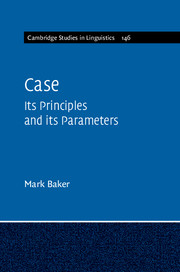Book contents
- Frontmatter
- Contents
- Acknowledgements
- Abbreviations and conventions
- Map of principal languages investigated and their case systems
- 1 The issue of structural case
- 2 The variable relationship of case and agreement
- 3 C-command factors in case assignment
- 4 Domains of dependent case assignment
- 5 Categories involved in case interactions
- 6 On the timing of case assignment
- 7 Conclusion: Putting together the big picture
- References
- Index
3 - C-command factors in case assignment
Published online by Cambridge University Press: 05 August 2015
- Frontmatter
- Contents
- Acknowledgements
- Abbreviations and conventions
- Map of principal languages investigated and their case systems
- 1 The issue of structural case
- 2 The variable relationship of case and agreement
- 3 C-command factors in case assignment
- 4 Domains of dependent case assignment
- 5 Categories involved in case interactions
- 6 On the timing of case assignment
- 7 Conclusion: Putting together the big picture
- References
- Index
Summary
In the previous chapter, I showed that case values can be assigned to NPs by configurational rules of dependent case assignment. This configurational mode of case assignment is an alternative to case being assigned by agreement with a functional head, and it seems to be no small part of the overall theory of morphological case. I have reasoned that all languages that have structural ergative case use this mode of case assignment, including ergative languages proper and tripartite languages. Furthermore, most of the languages with overt accusative case that I have worked on also seem to be of this type, in that they either do not have object agreement or object agreement does not track accusative case very closely. We have also seen that agreement on some functional heads depends on the agreed-with NP already having a particular case through a rule of dependent case assignment or unmarked case assignment.
While agreement-assigned case is arguably reasonably well understood, given the extensive literature on Agree and its properties, the notion of dependent case is less familiar. It requires further development in order to know what contribution it can make to understanding the case properties of the languages of the world. In particular, some conceptual analysis is in order to identify the likely range of parametric variation within the general domain of dependent case marking. Ideally, this parametric variation should be rich enough to be descriptively adequate, and restricted enough to be explanatorily adequate. Exploring the rules of configurational case assignment in detail, then, is the focus of the next three chapters.
- Type
- Chapter
- Information
- CaseIts Principles and its Parameters, pp. 79 - 110Publisher: Cambridge University PressPrint publication year: 2015



